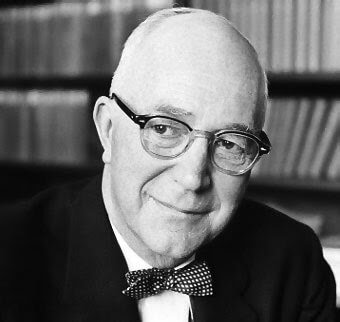Gordon Allport: The Father of Personality Psychology

Gordon Allport was a psychologist who laid the foundations of personality psychology. His theory is considered one of the first humanist theories because it conceives man as an autonomous being with free will. Allport argued that instincts and impulses aren’t the only things that motivate human beings. He also believed that humans aren’t governed by their past.
Allport’s work is enjoyable and accessible to the general public. He explained things in an easy way that anyone can understand. People who want to learn more about psychology should read Allport’s work.
Gordon Allport studied motivation and personality. He left a really important legacy and is a truly interesting figure in the field of psychology.
Early life
Gordon Allport was born in Indiana in 1897, but his family moved to Ohio when Gordon was still a child. His father was a doctor and worked out of his home. Consequently, Gordon Allport and his siblings were exposed to the world of medicine from a very early age. This sparked Allport’s interest in the field, and especially in psychology.
However, Allport ended up studying economics and philosophy. Since he never lost interest in social psychology, he eventually got his degree in psychology from Harvard University.
Sometime later, he traveled to Vienna. This was one of the most significant moments of his life because he met Sigmund Freud on this trip. Contrary to what you might think, Allport wasn’t impressed by the father of psychoanalysis. Like many humanist psychologists, Allport considered Freud’s theories quite limiting.

His work
After he returned to the United States, Allport started working as a psychology professor. He got a job at Harvard University, where he worked until his death. During his time at Harvard, he joined numerous committees and gave innovative lectures. In 1939, he was elected president of the American Psychological Association (APA).
Allport published several books. His most famous one is Becoming: Basic Considerations for a Psychology of Personality. During his lifetime, Allport received numerous awards that recognized his work and his contributions to the field of psychology. The APA awarded him the prestigious APA Award for Distinguished Scientific Contributions to Psychology.
Gordon Allport emphasized the importance of an individual’s conscious motivations and thoughts. That led to his interest in personality development. Allport tried to find a balance between the popular theories of his time. Behavioralism was incomplete and superficial, while psychoanalysis was overly complex. Meeting Freud cemented Allport’s interest in developing his own theory.
Contributions to psychology
His most famous contribution is his trait theory of personality, which posits that each human being has hundreds of traits. He classified 4500 words that define an individual and he grouped them into three levels:
- Cardinal traits: These are a person’s dominant traits. They shape their identity, emotions, and behavior.
- Central traits: These are primary traits, but they’re not dominant. They’re inherent in most people and they make up the foundation of personality and actions.
- Secondary traits: These are private traits that are particular to each individual. People often only reveal them in confidence and under certain circumstances.

The legacy of Gordon Allport
In addition to his trait theory of personality, Allport identified genotypes and phenotypes. He identified the internal and external conditions that motivate a person’s behavior. In his work Personality: A Psychological Interpretation (1937) he defined personality as: “the dynamic organization within the individual of those psychophysical systems that determine his unique adjustment to his environment“.
Allport also emphasized that each person has a different personality. He was also interested in the nature of people’s will, motivation, and determination. He stressed that every individual’s behavior and thoughts are the product of a whole life story. In other words, an individual’s thoughts are the fruit of their past and their present.
Allport promoted an interdisciplinary movement at Harvard University, which led the school to create the Social Science Division. Allport was also an outspoken critic of Freud’s psychoanalysis and radical behavioralism.
Gordon Allport also studied prejudice and religion. He analyzed the discrimination against Jews and African-Americans, which he featured in his book The Nature of Prejudice.
Allport died on October 9th, 1967. He left an unmistakable legacy in the field of psychology and is considered one of the pioneers of humanist psychology.
Gordon Allport was a psychologist who laid the foundations of personality psychology. His theory is considered one of the first humanist theories because it conceives man as an autonomous being with free will. Allport argued that instincts and impulses aren’t the only things that motivate human beings. He also believed that humans aren’t governed by their past.
Allport’s work is enjoyable and accessible to the general public. He explained things in an easy way that anyone can understand. People who want to learn more about psychology should read Allport’s work.
Gordon Allport studied motivation and personality. He left a really important legacy and is a truly interesting figure in the field of psychology.
Early life
Gordon Allport was born in Indiana in 1897, but his family moved to Ohio when Gordon was still a child. His father was a doctor and worked out of his home. Consequently, Gordon Allport and his siblings were exposed to the world of medicine from a very early age. This sparked Allport’s interest in the field, and especially in psychology.
However, Allport ended up studying economics and philosophy. Since he never lost interest in social psychology, he eventually got his degree in psychology from Harvard University.
Sometime later, he traveled to Vienna. This was one of the most significant moments of his life because he met Sigmund Freud on this trip. Contrary to what you might think, Allport wasn’t impressed by the father of psychoanalysis. Like many humanist psychologists, Allport considered Freud’s theories quite limiting.

His work
After he returned to the United States, Allport started working as a psychology professor. He got a job at Harvard University, where he worked until his death. During his time at Harvard, he joined numerous committees and gave innovative lectures. In 1939, he was elected president of the American Psychological Association (APA).
Allport published several books. His most famous one is Becoming: Basic Considerations for a Psychology of Personality. During his lifetime, Allport received numerous awards that recognized his work and his contributions to the field of psychology. The APA awarded him the prestigious APA Award for Distinguished Scientific Contributions to Psychology.
Gordon Allport emphasized the importance of an individual’s conscious motivations and thoughts. That led to his interest in personality development. Allport tried to find a balance between the popular theories of his time. Behavioralism was incomplete and superficial, while psychoanalysis was overly complex. Meeting Freud cemented Allport’s interest in developing his own theory.
Contributions to psychology
His most famous contribution is his trait theory of personality, which posits that each human being has hundreds of traits. He classified 4500 words that define an individual and he grouped them into three levels:
- Cardinal traits: These are a person’s dominant traits. They shape their identity, emotions, and behavior.
- Central traits: These are primary traits, but they’re not dominant. They’re inherent in most people and they make up the foundation of personality and actions.
- Secondary traits: These are private traits that are particular to each individual. People often only reveal them in confidence and under certain circumstances.

The legacy of Gordon Allport
In addition to his trait theory of personality, Allport identified genotypes and phenotypes. He identified the internal and external conditions that motivate a person’s behavior. In his work Personality: A Psychological Interpretation (1937) he defined personality as: “the dynamic organization within the individual of those psychophysical systems that determine his unique adjustment to his environment“.
Allport also emphasized that each person has a different personality. He was also interested in the nature of people’s will, motivation, and determination. He stressed that every individual’s behavior and thoughts are the product of a whole life story. In other words, an individual’s thoughts are the fruit of their past and their present.
Allport promoted an interdisciplinary movement at Harvard University, which led the school to create the Social Science Division. Allport was also an outspoken critic of Freud’s psychoanalysis and radical behavioralism.
Gordon Allport also studied prejudice and religion. He analyzed the discrimination against Jews and African-Americans, which he featured in his book The Nature of Prejudice.
Allport died on October 9th, 1967. He left an unmistakable legacy in the field of psychology and is considered one of the pioneers of humanist psychology.
This text is provided for informational purposes only and does not replace consultation with a professional. If in doubt, consult your specialist.







